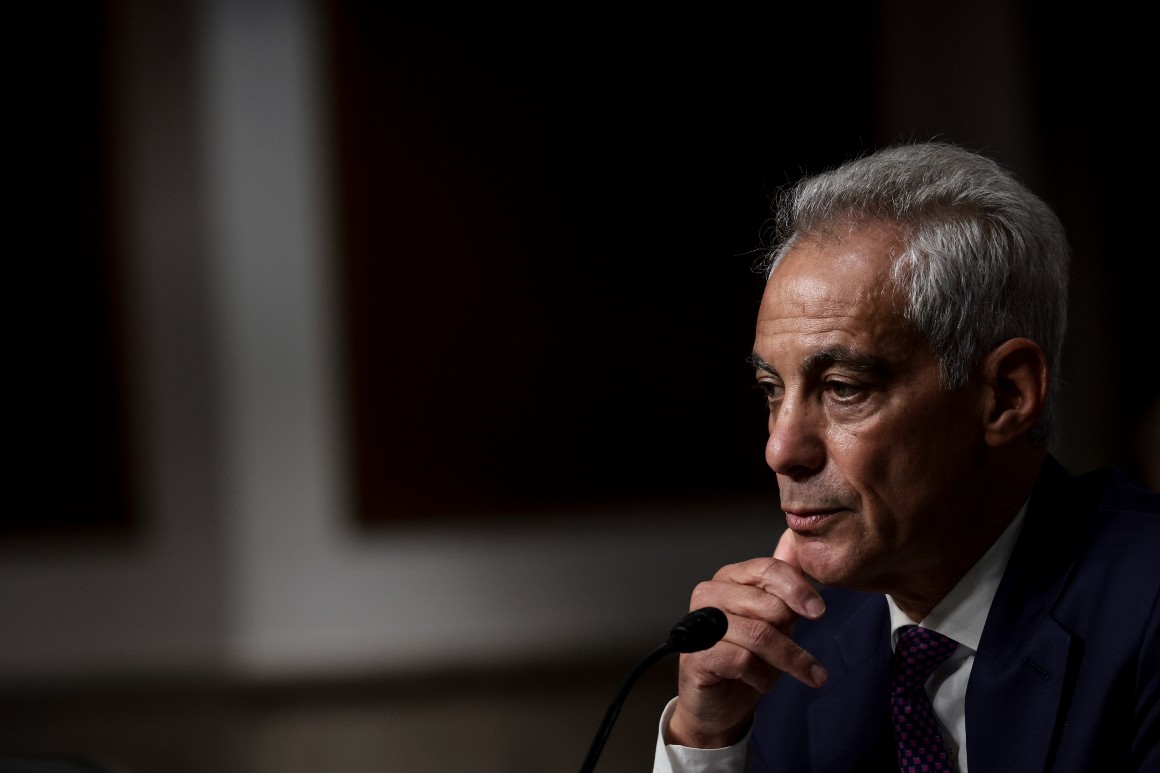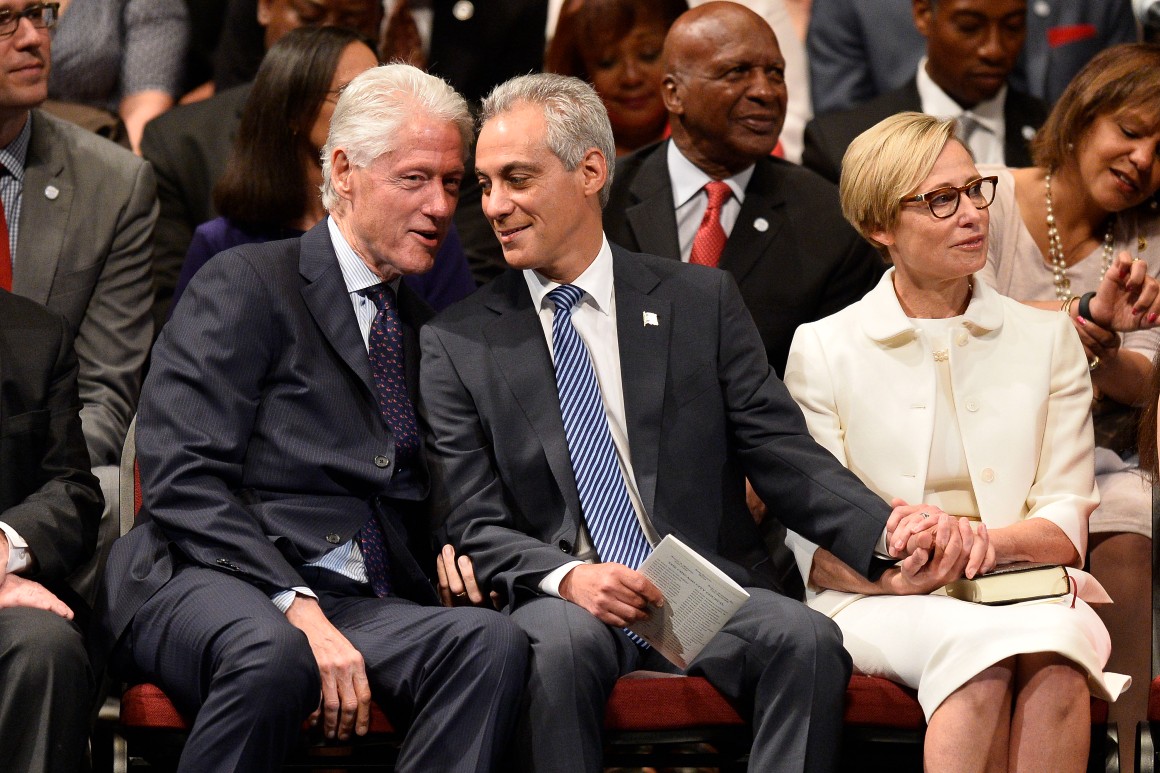
After Rahm Emanuel limped to the end of two controversy-pocked terms as Chicago mayor in 2019, many people assumed he would be consigned at last to irrelevance. Some critics, especially on the Democratic left, thought a sullen fadeaway was too good for Emanuel — he deserved some place a bit hotter to spend his political afterlife.
Less than three years later, Emanuel isn’t going to oblivion. And he isn’t going to hell, or at least not yet. He’s going to Tokyo. Emanuel leaves on Saturday to begin his term as President Joe Biden’s newly-confirmed U.S. ambassador to Japan.
What gives?
At a moment when police violence against people of color has become a national emergency, Emanuel left office showered by anger over how he and the city government handled one of the country’s most notorious episodes, the murder of 17-year-old Laquan McDonald, who was struck by 16 bullets while he walked away from an officer.
At a moment when the left is widely touted for its new power, Biden ignored the warnings of rising stars like Alexandria Ocasio-Cortez about a person they think epitomizes the problems of the Democratic Party. Instead, he appointed Emanuel to represent the country to a major world power — a posting historically given to such esteemed figures as Caroline Kennedy, former Vice President Walter Mondale and former Senate Majority Leader Mike Mansfield.
Emanuel’s survival is more than good luck. It comes from more than good connections, even as those obviously help.
It flows from some distinctive factors that illuminate important dynamics about contemporary politics — why many politicians see their careers shredded by controversy, while a much smaller number manage to transcend efforts to destroy them and prosper across long years.
There are three lessons that any political figure — even those who loathe Emanuel and the brand of Democratic centrism that he represents — could use to their advantage.f
Lesson One: Don’t Take the Hint
A more conventional politician with Emanuel’s scar tissue might have decided a major appointment in the Biden administration was asking for trouble. Simply put, his drive to be in the action is not conventional. Nor is his tolerance for pain.
Two other politicians help illustrate the point.
Al Franken resigned his job as U.S. senator from Minnesota. He did so grudgingly and came to regret his choice quickly. But in the moment he was accused of sexual harassment in December 2017, and was being excoriated by fellow Democrats like Sen. Kirsten Gillibrand (D-N.Y.), he felt he had no choice.
But he did have a choice. Look at Virginia Gov. Ralph Northam, who just finished his full term at the new year. He did so in a wave of generally favorable news coverage about his record on racial reconciliation. Much of it came from outlets that thundered for his resignation three years ago after revelations about a yearbook picture from 1984 of a man that appeared to be him wearing blackface. Northam had seemingly been on the verge of acquiescing to the calls for his departure before at the last moment deciding to stay put. In a television appearance, Emanuel had urged him not to resign, a clip that Northam saw. He called Emanuel with thanks.
It turns out one part of political power comes down to psychology. Having the brass ones to ignore public or private censure may or may not be a positive character trait as an individual. But in an age of rising political and media ferocity, it can be an indispensable part of political character. Most people simply aren’t wired that way.
Emanuel was, at a young age. In 1993, when Emanuel was former President Bill Clinton’s first White House political director, his brash style earned the disapproval of first lady Hillary Rodham Clinton. She wanted him gone. White House chief of staff Mack McLarty arrived with a not-so-subtle suggestion that Emanuel might be happier at the Democratic National Committee. Emanuel said he wasn’t leaving the White House unless Bill Clinton himself told him to — knowing that the conflict-averse president was not likely to force the issue. Within a couple of years, Emanuel had relentlessly climbed back into favor as one of the handful of most important Clinton aides.

Disavowing a smart-set consensus about whether you are up or down, or about what one is “supposed to do” in response to setbacks, is easier for someone like former President Donald Trump, whose whole appeal is based on contempt for establishment pieties. It is harder for someone like Emanuel — or Clinton or former President Barack Obama — whose whole career involves navigating the establishment and winning its top prizes. Yet it is precisely this kind of monomania for staying alive and in the arena that allows Emanuel to seek and win a top Biden appointment even with all the scar tissue he has accrued.
Lesson Two: Keep the Soul of a Hack
Emanuel started out as an operative, as a fundraiser and campaign hand for the Democratic Congressional Campaign Committee. On his climb upward after the Clinton years — as an investment banker, member of Congress, White House chief of staff for Obama, and then mayor — it would have been perfectly natural for him to think, “I’ve earned the right to stop hustling and to act with the dignity and distance of a principal.”
What Emanuel knows is that in modern political culture, operatives — who are close to the gossip, to the evolving media narrative, to who is trying to knife who — often have more real power than principals. It is the same thing that an operative-turned-principal of another generation, James Baker, understood. Even after he became secretary of the Treasury and secretary of State, he never stopped working Washington and working the story.
Who is that ringing my mobile phone on a Sunday morning? Oh, it’s Rahm. I’m out for a walk with the dogs — should I take it? Sure, why not. What’s on his mind? Usually some question about whether I saw some article, or some conceptual argument he has about how Democrats are blowing it on this or have a big opportunity to win on that. He’s smart, he’s funny, he’s perceptive in his assessments of fellow politicians. Pretty quickly, he’s gone, on to the next call.
I enjoy the exchanges, but I am under no illusions that I’m in an exclusive group. How many people get these calls? I feel sure there are many dozen. (“I was talking to Daschle …” “Carville was saying the same thing you are but Paul disagrees ...”) I know of multiple journalists who get them.
Perhaps that proves we are all equally swamp creatures. But, simply on practical grounds, the operative mindset is essential to how Emanuel wields power. It is why he made common cause with Biden in the Obama White House. It is why chief of staff and fellow operative Ron Klain (who can be seen as he looked 30 years ago with Emanuel in The War Room, the Clinton ’92 campaign documentary) believed he had to come up with some cool job for Emanuel even once the original idea of secretary of Transportation didn’t come through. It was why several key members of Chicago City Council's Black Caucus, as well as New Jersey Sen. Cory Booker, backed Emanuel’s ambassadorial nomination, preventing the vote from becoming a racial litmus test.
An aside: Given how much politicians fret over news coverage — craving more of it, yet also bemoaning what they do get — it’s surprising how few have mastered the relatively easy art of working the media. There’s nothing that Emanuel does that could not be done by any ambitious politician on left or right. He’s already working the Japanese media.
Lesson Three: Governance Matters
I know Emanuel well enough to know the ways he is like most other politicians, and unlike them. I know him too well to be the right reporter to appraise his record on the merits.
If you want a recital of why many people regard him as a deplorable figure, there’s a decent one here and another with a roster of indictments here.
Still, as for the ire he prompts on the left, it is striking to me that in the nearly three decades I have been covering Emanuel, the mythology around him has shifted from a reputation as a rabid Democratic partisan to a reputation as a repellent Democratic apologist — an appeaser of business and conservatives, who is hardly a progressive at all.
Adherents to this latter view won’t be surprised that Emanuel’s 48-21 confirmation in the Senate — 31 senators did not vote — came with the support of such Republicans as Sens. Roy Blunt of Missouri and Rob Portman of Ohio.
It is not intended as a taunt aimed at people on the left who view Emanuel as a Democrat In Name Only, just a statement of practical fact, that his hands have been intimately on more concrete progressive achievements than most of his adversaries on the left. These include the landmark CHIP health program for children from families with lower incomes, which Emanuel negotiated on behalf of Clinton in 1997. It includes a key role in helping Democrats win the House in 2006, which elevated Nancy Pelosi to the speakership. It included expansion of pre-K instruction in Chicago’s troubled public schools, a raise in the minimum wage and subsidized community college during his term as mayor.
The Democratic debate on the right balance of pragmatism and ideology will likely grow more intense in coming years. It seems probable that Emanuel’s attraction to the tactile work of government, and the relationships he established in that work, is one reason he’s still on the stage when so many people wanted to chase him off it.
----------------------------------------
By: John F. Harris
Title: Why the Left Couldn’t Destroy Rahm Emanuel
Sourced From: www.politico.com/news/magazine/2022/01/13/left-couldnt-destroy-rahm-emanuel-527008
Published Date: Thu, 13 Jan 2022 04:31:43 EST






